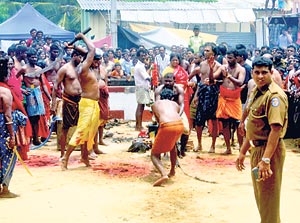Animal rights activists and religious leaders are advocating the introduction of legislation to prohibit religious sacrifice of animals, in the aftermath of the Sunday Times exposure of the ritual at a place of religious worship.
Two weeks ago more than 200 goats were slaughtered in public at the Munneshwaram kovil in Chilaw, as police officers looked on.
The Colombo Municipal Council’s chief veterinarian, Dr. D. Eleperuma, said, although the slaughter of animals in public was prohibited by the Butchers’ Ordinance Act there were no laws prohibiting the slaughter of animals as religious sacrifice.
 |
| The Sunday Times September 6 Page 1 picture of the goat sacrifice at the Munneswaram Kovil |
“The Butchers’ Ordinance clearly prohibits the slaughter of animals in public. It outlines the procedures and the people who can be in the premises when animals are being slaughtered.
Even in the case of issuing permits for private slaughtering, many issues, including who is doing it, for what purpose and where, are looked into. During the Haj festival period we receive a considerable number of requests for temporary permits to slaughter goats or bulls,” he said.
According to Dr. Eleperuma, the legislation on the prevention of cruelty to animals passed in 1907 was archaic and vague and did not provide any legal frame work on the prohibition of animal sacrifice.
According to former Supreme Court Judge C. V. Vigneshwaran, during the late seventies and early eighties there were several court rulings in Jaffna prohibiting Hindu temples from carrying out animal sacrifice in the hallowed precincts.
“There have been several instances where private individuals or groups sought the assistance of court to stop such practices prevalent in some of the Hindu temples in the area. When such a case was heard court examined whether it was a religious practice or a social custom and in almost all the cases they were social customs and court ruled that the slaughter be banned when it hurt the religious susceptibilities of worshippers. But the ruling was applicable to the particular temple only,” he said.
Animal rights activist Sagarika Rajakarunanayake said Sri Lanka should follow the Indian example of prohibiting animal sacrifice.
She said, it would be an eye opener to Sri Lankan law makers who consider animal sacrifice to be a “sensitive issue” as it could offend religious sensitivities. According to Ms. Rajakarunanayake, in India, animal sacrifice is prohibited by the Animal and Bird Sacrifices Prohibition Act of 1950 in several predominantly Hindu states including Andhra Pradesh (1950), Tamil Nadu (1950), Pondicherry (1965), Rajasthan (1975), Gujarat (1972), and Karnataka (1959).
“The Indian example of prohibiting animal sacrifice makes it ridiculous for Sri Lanka to fight shy of abolishing it here. While India has moved forward in abolishing animal sacrifice, in Sri Lanka, politicians, administrators and police, are piously trying to safeguard “religious tolerance” and turning a blind eye to the unspeakable cruelty inflicted on animals, and the outrageous violation of Buddhist and Hindu principles of compassion to all living beings,” she said.
“This is clearly evident in the comment made to the Sunday Times, by Chandana Kumara, Chilaw Pradeshiya Sabha secretary, who shamefully condoned the barbaric slaughter of 200 goats at the kovil saying it was a practice that had been taking place for many years in other kovils as well, with thousands of devotees participating. He and other administrators have not taken the trouble to study how this matter has been handled in neighbouring India,” she charged. Meanwhile, All Ceylon Hindu Congress president K. Neelakandan said the sacrifice of animals was not a practice according to Hindu religion but a custom prevalent in backward areas of the country.
“Even earlier we denounced this act and we still oppose it vehemently. We have been educating the public on the matter for a long time. Since the ’50s, it has reduced a lot but it is still practised in the Maha Badrakaliamman kovils in the country,” he said. |

